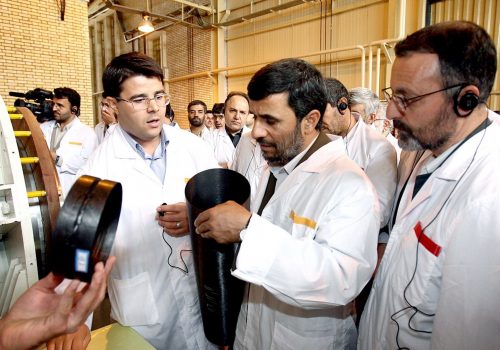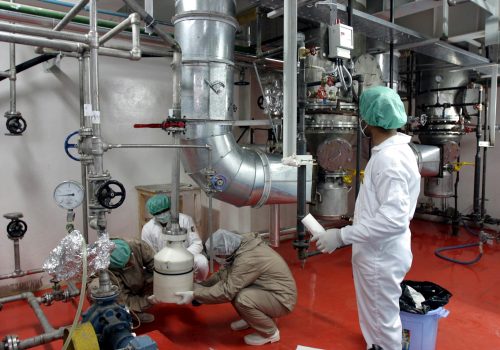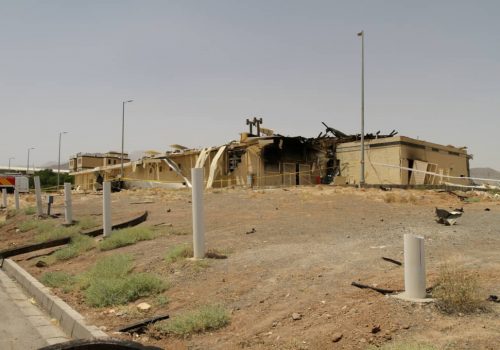Iran offers less for more as Vienna talks stall
More than five months after multilateral nuclear talks with Iran were paused before the country’s presidential elections in June, a new negotiating team arrived in Vienna in late November with additional demands and fewer concessions than its predecessors.
The most charitable interpretation is that this tough new stance—offering less in nuclear compliance while demanding more sanctions relief than promised by the 2015 nuclear deal—is an opening bargaining position by the government of President Ebrahim Raisi. But it also could presage the demise of the Joint Comprehensive Plan of Action (JCPOA) if it continues to be coupled with an accelerating nuclear program that, according to the latest International Atomic Energy Agency (IAEA) assessment, included the highly provocative production of 20 percent enriched uranium at the underground Fordow nuclear facility.
Iran began exceeding JCPOA limits on both its allowed stockpile and level of enrichment a year after the Donald Trump administration withdrew from the deal in May 2018 and began re-imposing economic sanctions. Hopes had arisen, however, that the Joe Biden administration would be able to return to the landmark non-proliferation agreement if Iran also went back to full compliance.
Exasperation that those hopes are not closer to fruition was clear in the voice of a senior State Department official, who briefed this analyst and others on the Vienna talks on December 4. Iran, he said, came back to Vienna after a five-month hiatus “with proposals that walked back… the compromises Iran had floated during the six rounds of [prior] talks, pocketed all of the compromises that others and the US, in particular, had made, and then asked for more. In other words, [Iran had] not come back with a serious proposal about how we could resume mutual compliance with the JCPOA, but raised issues that go beyond the JCPOA.”
The US is not alone in its frustration with Iran. The European Union, which convened the talks, and Britain, France, and Germany, which remain parties to the JCPOA, are also upset by the Iranian stance. With the US largely maxed out on economic sanctions, pressure will mount on the Europeans to also restore formal sanctions on Iran if there is no progress in the talks and Iran’s nuclear program continues to advance. The senior US official suggested that the IAEA’s Board of Governors, which has seen Iran reduce cooperation in recent months, might convene in an emergency session before the end of the year to discuss a resolution censuring Iran—something it has refrained from doing as Iran accelerated its program and while talks continue. The most extreme step would be a snapback of United Nations sanctions by one of the non-American permanent members of the UN Security Council, effectively terminating the nuclear agreement.
Some in Iran are understandably ambivalent about reviving the JCPOA given the ease with which the Trump administration quit—when Iran was in full compliance—and the fact that no US administration can guarantee the actions of its successor. However, even a short-term easing of US sanctions while Biden is in office would give Iran access to billions of dollars in oil revenues frozen in foreign accounts, allowing it to sell much more oil than the million barrels a day it is currently exporting—half of which goes to China. This would likely prop up Iran’s sagging currency and reduce the crushing inflation that is pushing millions of Iranians out of the middle class and into poverty. As the senior US official noted: “Every day that goes by, Iran is denying its people the benefits of sanctions relief.”
Raisi officials have sought to get the US to ease sanctions upfront by authorizing the release of some frozen cash, but that appears to be a nonstarter given Iran’s nuclear escalation. Instead, the US is looking for a way to sequence sanctions relief with Iranian steps to reduce uranium stockpiles and mothball advanced centrifuges.
Iran has historically survived sanctions by relying on domestic production, trade with its immediate neighbors, and oil sales to China. The key to whether the JCPOA survives may be China’s willingness to exert some pressure of its own. At this point, it is not clear that Beijing will do so, given its strong opposition to US economic warfare and its myriad other disputes with Washington.
If the JCPOA collapses, it will reconfirm a forty-year history of acrimony and dysfunction between the US and Iran following the 1979 Islamic revolution. The nuclear agreement was a rare exception that resulted from, what in hindsight, appears to have been unique circumstances—an international community united behind a strategy of engagement and sanctions, and talented negotiators on both sides who developed a significant rapport.
The new Iranian negotiators, however, weren’t educated in the West and are more oriented toward authoritarian models of governance. They see Western democracies as a threat to Iran’s theocratic political system and seem to have little fear of attack from a US that is retrenching militarily in the Middle East and has no interest in new “forever wars.”
Tellingly, Biden administration officials have not threatened military action against Iran if it continues its nuclear advancements. Instead, they have stressed, as the senior official did on December 4, “other diplomatic outcomes” that the US and its regional partners are prepared to pursue. “If we were to conclude that Iran had killed the JCPOA, other sanctions would be imposed—more than US sanctions,” the official said. He also stressed that Iran cannot fully benefit from economic ties with other countries, including its neighbors across the Persian Gulf, without the lifting of US sanctions, which drastically impede Iran’s ability to participate in the international financial system.
If the JCPOA dies, it will reflect both US dominance of the financial system as well as the difficulty of pursuing a consistent US foreign policy. Even if the deal survives, it is doubtful that Western multinational companies will return to Iran given the lack of confidence that the US will stay in the deal if a Republican wins the presidential elections in 2024, as noted by the former French Ambassador to the United States, Gerard Araud. Additionally, such companies will be hesitant to enter Iran because of the corruption and lack of transparency in Iran’s economy and judicial system.
There may also have been an inherent flaw in the diplomacy that produced the JCPOA.
As a student of mine this year at George Washington University, Rosaleen Carroll, rightfully pointed out: the imbalance of power between the US and Iran may have doomed the JCPOA from the start. Indeed, the US and Iran are not peer competitors—like the US and the former Soviet Union—and thus, Washington was able to violate its commitments to Iran with impunity. Iran, in turn, resents being cornered by a superpower and might prefer to “resist” rather than prosper.
Barbara Slavin is director of the Future of Iran Initiative at the Atlantic Council. Follow her on Twitter: @BarbaraSlavin1.
Further reading
Tue, Dec 8, 2020
A history of continuity in Iran’s long nuclear program
IranSource By Sina Azodi
Iran’s interest in developing a nuclear deterrent is often attributed to the Islamic Republic. However, in reality, this interest predates the 1979 revolution and reflects a deep-seated desire for national prestige and development, as well as a need to deter regional rivals.
Tue, Nov 12, 2019
Iran isn’t dashing toward a bomb—for now
IranSource By
Iran’s most recent step to breach the nuclear restrictions in the 2015 multilateral deal known as the Joint Comprehensive Plan of Action (JCPOA) does not pose a near-term proliferation risk, but it is a significant escalation by Tehran that risks shutting the door on negotiations to restore compliance with the accord. Iranian President Hassan Rouhani […]
Fri, Jul 10, 2020
A series of unusual events in Iran point to sabotage. How will Tehran respond?
IranSource By Borzou Daragahi
A spate of explosions has struck highly secure and sensitive sites, as well as regular industrial locales, including factories and gas pipelines, and even a clinic in a fancy part of north Tehran.
Image: Iran's chief nuclear negotiator Ali Bagheri Kani and members of the Iranian delegation wait for the start of a meeting of the JCPOA Joint Commission in Vienna, Austria November 29, 2021. EU Delegation in Vienna/Handout via REUTERS


